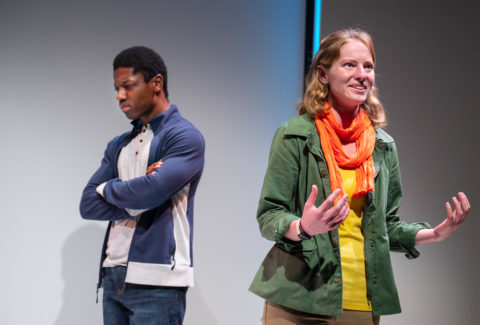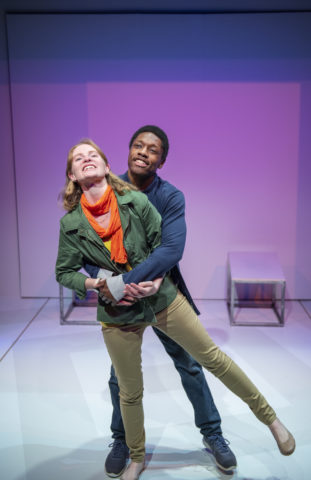 “Actually” angered me. Opening night of the Aurora Theatre Company production of this disturbing, two-actor take on campus sexual assault came quick on the heels of last week’s revelation of admissions scandals, increasing my current disgust with the bureaucracy and sophistry of elite academia.
“Actually” angered me. Opening night of the Aurora Theatre Company production of this disturbing, two-actor take on campus sexual assault came quick on the heels of last week’s revelation of admissions scandals, increasing my current disgust with the bureaucracy and sophistry of elite academia.
Anna Ziegler’s knotty drama, tautly directed by Tracy Ward, centers on the moral and perceptual ambiguities that arise during a Princeton University disciplinary hearing: Freshman Amber (Ella Dershowitz) says her classmate, Tom (Michael A. Curry), has raped her. The hearing, before a faculty panel, takes place in a seminar room where, in one of the characters’ many direct statements to the audience, Tom recalls participating in a class debate a few weeks earlier, during which “I started to agree with the other side, just because they weren’t so annoying.”
That’s a feeling audience members are likely to struggle with, too. You’ll aspire to fairly considering each character’s account of events before coming to your own conclusion. But Amber is written as such a needy, babbling, insecure and immature young woman that your own annoyance may sway you. Dershowitz’s vanity-free playing of the role is excruciatingly convincing.
Tom, on the other hand, is a sensitive, self-possessed scholarship student. Black and raised by a single mother, he plays classical piano and forms a fast, open-minded friendship with a gay Indian-American classmate. Played by Curry with just the right blend of swagger and sweetness, he’s the kind of guy who, it may occur to you, gets accused of a crime he didn’t commit by the neurotic, privileged Jewish girl in this sort of story.
 But Ziegler knows the same stereotypes you do and has great fun setting expectations spinning. Her sharp, fragmented dialogue and genuinely poignant character backstories accrete and evolve. Consider the early death of Amber’s father, her bitterly critical mother, her binge-drinking; Tom’s violent streak, his mother’s cancer diagnosis, his sense of a constant, critical white gaze.
But Ziegler knows the same stereotypes you do and has great fun setting expectations spinning. Her sharp, fragmented dialogue and genuinely poignant character backstories accrete and evolve. Consider the early death of Amber’s father, her bitterly critical mother, her binge-drinking; Tom’s violent streak, his mother’s cancer diagnosis, his sense of a constant, critical white gaze.
Because the two characters are written and performed with such impressive complexity, the “he said, she said” aspect of “Actually” is fascinating. But the “they judge” aspect is infuriating. Even as they contradict each other during the hearing, both Amber and Tom remark on the strangeness of their case being decided by professors.
The fact that universities are able to quietly operate their own de facto legal systems, meting out academically oriented punishments (expulsion, suspension) for possibly criminal activity, speaks to a repugnant institutional arrogance. It prioritizes a school’s protecting its reputation over protecting its students.
In the world portrayed by “Actually” — a world in which both playwright and audience are somewhat complicit — the parsing of meaning, excavating of subtext and interpretation of symbols become more compelling than the pursuit of justice. At the end of the play’s 90 minutes, rape seems less a violent act of crime than an abstraction for intellectual debate.
